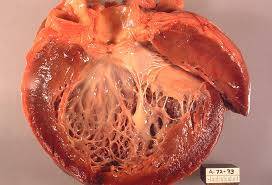Certainly, let's delve into cardiomyopathy, including its causes, signs, effects, and solutions.
**Causes of Cardiomyopathy:**
1. Genetics (family history)
2. Infections (e.g., viral myocarditis)
3. Alcohol abuse
4. Drug abuse (e.g., cocaine, amphetamines)
5. Hypertension (high blood pressure)
6. Diabetes
7. Thyroid disorders
8. Autoimmune diseases
9. Iron buildup in the heart (hemochromatosis)
10. Certain medications (e.g., chemotherapy drugs)
11. Pregnancy-related complications
12. Chronic kidney disease
13. Nutritional deficiencies (e.g., thiamine deficiency)
14. Radiation therapy
15. Connective tissue disorders
16. Muscular dystrophy
17. Sarcoidosis
18. Amyloidosis
19. Certain neuromuscular diseases
20. Idiopathic (unknown cause)
**Signs and Symptoms of Cardiomyopathy:**
1. Shortness of breath (dyspnea)
2. Fatigue and weakness
3. Swelling in the legs, ankles, and feet (edema)
4. Irregular heartbeat
5. Chest pain or discomfort
6. Dizziness or lightheadedness
7. Fainting (syncope)
8. Rapid weight gain due to fluid retention
9. Abdominal swelling or discomfort
10. Reduced exercise tolerance
11. Cough, especially at night or when lying flat
12. Palpitations (feeling of strong, fast, or irregular heartbeat)
13. Bluish skin or lips (cyanosis)
14. Enlarged liver
15. Decreased alertness or confusion
16. Dry, hacking cough
17. Elevated neck veins
18. Reduced appetite and nausea
19. Depression and anxiety
20. Increased risk of blood clots
**Effects of Cardiomyopathy:**
1. Reduced pumping ability of the heart
2. Congestive heart failure
3. Blood clots
4. Stroke
5. Irregular heart rhythms (arrhythmias)
6. Sudden cardiac arrest
7. Heart valve problems
8. Cardiac enlargement
9. Increased risk of heart attack
10. Enlarged heart chambers
11. Reduced exercise capacity
12. Kidney dysfunction
13. Liver problems
14. Gastrointestinal issues
15. Pulmonary edema (fluid in the lungs)
16. Reduced quality of life
17. Mental health issues (anxiety, depression)
18. Decreased sexual function
19. Frequent hospitalizations
20. High risk of death if not managed effectively
**Solutions and Management of Cardiomyopathy:**
1. Medications (e.g., ACE inhibitors, beta-blockers, diuretics)
2. Lifestyle changes (e.g., low-sodium diet, weight management)
3. Regular exercise as recommended by a healthcare provider
4. Avoiding alcohol and drugs
5. Treating underlying causes (e.g., high blood pressure, diabetes)
6. Implantable devices (e.g., pacemakers, defibrillators)
7. Heart valve repair or replacement surgery
8. Heart transplant (in severe cases)
9. Nutritional support (e.g., thiamine for certain types of cardiomyopathy)
10. Managing infections if they are the cause
11. Genetic counseling for familial cardiomyopathy
12. Palliative care for advanced cases
13. Emotional and psychological support
14. Support groups and education
15. Cardiac rehabilitation
16. Oxygen therapy
17. Dietary supplements (under medical guidance)
18. Reduced stress
19. Regular monitoring and follow-up with healthcare professionals
20. Continuous medications for symptom management and to slow the progression of the condition
Cardiomyopathy is a complex condition with various underlying causes, and its treatment and management should be tailored to the specific type and needs of the patient. Consulting with a healthcare professional is crucial for proper diagnosis and management.



No comments yet
Be the first to share your thoughts!